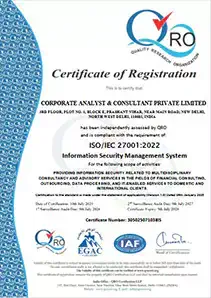CAC offers well-trained professionals that provide great shared service solutions. Throughout the decades, shared services were primarily regarded as an instrument of operational efficiency and cost reduction, which enables organizations to consolidate their back-office operations, standardize their processes and reduce the cost structure. Nevertheless, this model has wildly changed. Shared services today have evolved and are no longer by themselves seen as only a mechanism to elicit cost efficiencies, but functional facilitators of innovation, sources of business insights and producers of superior customer experiences. With the usage of modern technologies, such as automation and data analytics, shared services consulting have evolved in such a way to promote business agility and scalability along with the growth of business as a whole. The change enables them to be strategic partners in organizations to ensure they promote continuous improvement to support the ability of companies to remain competitive in the quickly evolving business world.
Why Should You Opt for the Shared Services Consulting?
The Early Days: Efficiency and Cost Focus
The initial wave of shared services consulting dates back to the 1980s and 1990s and was being motivated by the cognitive requirement of efficiency and cost cutting of operations. Big companies began to unify support areas, such as finance, HR, IT and procurement and to create central hubs of those functions to do away with duplication of efforts and achieve economies of scale. These initial shared services centers (SSCs) involved transactional work, standardization, and offering of services at the minimal cost. Having an efficient way of streamlining and reducing costs was what measured their success. Even though they were effective, these SSCs were perceived as a cost center, but not as builders of a higher organizational value or innovation.
The Shift towards Value Creation
With increased market competition and changes in the expectations of customers, organizations started to recognize that it was becoming insufficient to focus on the cost cutting alone. Such necessity of increased agility, speed of decision-making, and constant innovation led to a significant change in shared services. The use of high technologies like automation, artificial intelligence (AI) and analytics became a core trend SSCs started to use to enhance quality and speed of provided services. These advances made it possible for SSCs to go further than providing transactional support and became important business knowledge and strategic advice providers. This change assisted institutions in improving operations, innovation, and eventually sustainable growth of the business.
Becoming Strategic Partners
Shared services centers today are no longer merely support departments overseeing routine business operations. They are intended to be strategic partners who favorably impact the expansion and development of the business. SSCs facilitate companies to grow and respond to market needs more rapidly by providing value-added knowledge and helping with strategic initiatives. For example, they act as innovation laboratories to pilot and implement emerging technologies, create data-driven intelligence to enable forward-thinking decision-making, and optimize internal processes in order to unlock resources for client experience improvement. SSCs have become the essential, highly valued drivers of an organization’s overall success due to this shift.
Talent and Capability Building
Talent requirements have also changed as a result of the development of shared services. In addition to operational knowledge, modern SSCs today require workers with strong analytical, digital, and strategic thinking abilities. Teams need to be skilled at managing technology, utilizing data, and promoting change within the company. Employees are now able to take on more strategic, value-adding responsibilities instead of just transactional ones because to this change. Shared services consulting help companies remain flexible and competitive in a business environment that is becoming more complicated and fast-paced by cultivating a culture of innovation, leadership, and continuous development.
Conclusion
The evolution of shared services highlights a powerful shift from mere cost-cutting to strategic value creation. Modern shared services now play a crucial role in driving innovation, enabling data-driven decision-making, and building operational agility. CAC focuses on assisting businesses in realizing the full potential of shared services consulting.

















